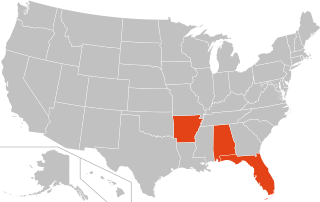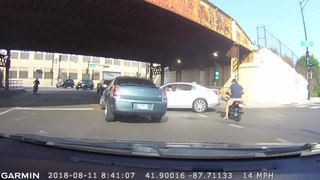Related Research Articles
A misdemeanor is any "lesser" criminal act in some common law legal systems. Misdemeanors are generally punished less severely than more serious felonies, but theoretically more so than administrative infractions and regulatory offences. Typically misdemeanors are punished with monetary fines or community service.
Drunk driving is the act of operating a motor vehicle with the operator's ability to do so impaired as a result of alcohol consumption, or with a blood alcohol level in excess of the legal limit. For drivers 21 years or older, driving with a blood alcohol concentration (BAC) of 0.08% or higher is illegal. For drivers under 21 years old, the legal limit is lower, with state limits ranging from 0.00 to 0.02. Lower BAC limits apply when operating boats, airplanes, or commercial vehicles. Among other names, the criminal offense of drunk driving may be called driving under the influence (DUI), driving while intoxicated or impaired (DWI), operating [a] vehicle under the influence of alcohol (OVI), or operating while impaired (OWI).

Driving under the influence (DUI) is the offense of driving, operating, or being in control of a vehicle while impaired by alcohol or other drugs, to a level that renders the driver incapable of operating a motor vehicle safely.
In the United States, habitual offender laws were first implemented on March 7, 1994, and are part of the United States Justice Department's Anti-Violence Strategy. These laws require both a severe violent felony and two other previous convictions to serve a mandatory life sentence in prison. The purpose of the laws is to drastically increase the punishment of those convicted of more than two serious crimes.

An ignition interlock device or breath alcohol ignition interlock device is a breathalyzer for an individual's vehicle. It requires the driver to blow into a mouthpiece on the device before starting or continuing to operate the vehicle. If the resultant breath-alcohol concentration analyzed result is greater than the programmed blood alcohol concentration, the device prevents the engine from being started. The interlock device is located inside the vehicle, near the driver’s seat, and is directly connected to the engine’s ignition system. It is a form of electronic monitoring.
License suspension or revocation traditionally follows conviction for alcohol-impaired or drunk driving. However, under administrative license suspension (ALS) laws, sometimes called administrative license revocation or administrative per se, licenses are confiscated and automatically suspended independent of criminal proceedings whenever a driver either (1) refuses to submit to chemical testing, or (2) submits to testing with results indicating a blood alcohol content of 0.08% or higher.
Mandatory sentencing requires that offenders serve a predefined term for certain crimes, commonly serious and violent offenses. Judges are bound by law; these sentences are produced through the legislature, not the judicial system. They are instituted to expedite the sentencing process and limit the possibility of irregularity of outcomes due to judicial discretion. Mandatory sentences are typically given to people who are convicted of certain serious and/or violent crimes, and require a prison sentence. Mandatory sentencing laws vary across nations; they are more prevalent in common law jurisdictions because civil law jurisdictions usually prescribe minimum and maximum sentences for every type of crime in explicit laws.

Under the Constitution of Finland, everyone is entitled to have their case heard by a court or an authority appropriately and without undue delay. This is achieved through the judicial system of Finland.

A juvenile court is a tribunal having special authority to pass judgements for crimes that are committed by children who have not attained the age of majority. In most modern legal systems, children who commit a crime are treated differently from legal adults that have committed the same offense.
Many countries have adopted a penalty point or demerit point system under which a person’s driving license is cancelled or suspended based on the number of points accumulated by them over a period of time because of the traffic offences or infringements committed by them in that period. The demerit points schemes of each jurisdiction varies. These demerit schemes are usually in addition to fines or other penalties which may be imposed for a particular offence or infringement, or after a prescribed number of points have been accumulated.

The Solomon–Lautenberg amendment is a U.S. federal law enacted in 1990 that urges states to suspend the driver's license of anyone who commits a drug offense. A number of states passed laws in the early 1990s seeking to comply with the amendment, in order to avoid a penalty of reduced federal highway funds. These laws imposed mandatory driver's license suspensions of at least six months for committing any type of drug offense, regardless of whether any motor vehicle was involved in the offense. As the amendment allows states to "opt out" without penalty, however, only four states continue to have such laws in effect as of 2020.

In Germany, a medical-psychological assessment is used by the authorities in deciding whether to revoke or reissue a driving licence. Medical-psychological assessment has been shown to be highly effective at reducing the recidivism rate for drink drivers. Drivers who are identified as potentially unfit may have their driver's license suspended and must satisfactorily complete an MPU to get their license reinstated. MPUs are commonly required due to drug- and alcohol-related offenses, or any other offenses that demonstrate a potential lack of maturity and judgment to safely participate in traffic.
The U.S. state of Maryland has various policies regarding the production, sale, and use of different classes and kinds of drugs.
Rummel v. Estelle, 445 U.S. 263 (1980), was a United States Supreme Court case in which the Court upheld a life sentence with the possibility of parole under Texas' three strikes law for a felony fraud crime, where the offense and the defendant's two prior offenses involved approximately $230 of fraudulent activity.
The laws of driving under the influence vary between countries. One difference is the acceptable limit of blood alcohol content before a person is charged with a crime.
Graham v. Florida, 560 U.S. 48 (2010), was a decision by the Supreme Court of the United States holding that juvenile offenders cannot be sentenced to life imprisonment without parole for non-homicide offenses.

Yong Vui Kong v. Public Prosecutor was a seminal case decided in 2010 by the Court of Appeal of Singapore which, in response to a challenge by Yong Vui Kong, a convicted drug smuggler, held that the mandatory death penalty imposed by the Misuse of Drugs Act ("MDA") for certain drug trafficking offences does not infringe Articles 9(1) and 12(1) of the Constitution of Singapore.

In traffic laws, a hit and run or a hit-and-run is the act of causing a traffic collision and not stopping afterwards. It is considered a supplemental crime in most jurisdictions.
Expungement in the United States is a process which varies across jurisdictions. Many states allow for criminal records to be sealed or expunged, although laws vary by state. Some states do not permit expungement, or allow expungement under very limited circumstances. In general, once sealed or expunged, all records of an arrest and of any subsequent court proceedings are removed from the public record, and the individual may legally deny or fail to acknowledge ever having been arrested for or charged with any crime which has been expunged.
Driving under the influence (DUI) occurs when a person operates a motor vehicle while under the influence of drugs or alcohol, or when the driver has a blood alcohol level of 0.08 or greater. Minors and young adults aged 18–20 can be charged with impaired driving based on blood alcohol levels of 0.01 or higher, and CDL license holders can be charged based upon blood alcohol levels of 0.04 or higher.
References
- ↑ "Let's Talk about the Prayer for Judgment Continued ("PJC")". North Carolina Bar Association . Retrieved 2013-12-15.
- ↑ "Motor Vehicles; G.S. 20-28(b); Mandatory Punishment for Driving While License Permanently Revoked" . Retrieved 2018-12-26.